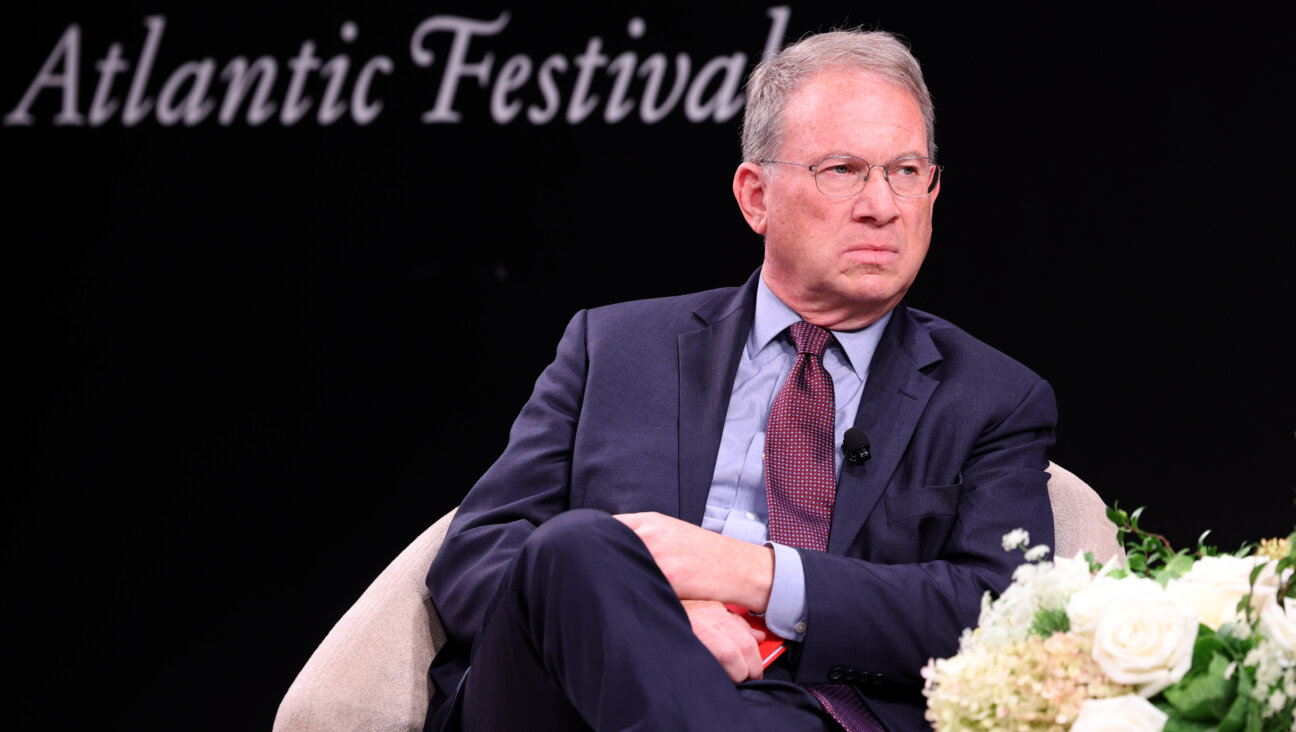Likud Lawmakers Facing Indictment in Voting Scandal
JERUSALEM — Two Likud Knesset members are set to be indicted for double voting, marking the first time that such action has been taken against legislators relating to activities conducted inside the Israeli parliament building.
Likud lawmakers Michael Gorlovsky and Yechiel Hazan will be indicted shortly on charges that they voted twice — for themselves and another legislator — during the Knesset vote at the end of May on the emergency economic plan. They will be granted a hearing by Attorney General Elyakim Rubinstein and State Prosecutor Edna Arbel before the indictments are formally submitted.
Rubinstein and Arbel opted not to press charges against three others who were suspected of double voting — Interior Minister Avraham Poraz of Shinui, Wasal Taha of Balad and Deputy Public Security Minister Ya’acov Edri of Likud. Rubinstein said the file against Edri was closed for lack of evidence, and the files against Taha and Poraz were closed because they had done nothing wrong.
News of the pending indictments comes as several other investigations are proceeding against Likud members. Prime Minister Ariel Sharon and his two sons, Omri and Gilad, are under investigation for receiving a $1.5 million loan from British businessman Cyril Kern. The family has been accused by Rubinstein of stalling the investigation by invoking their right to remain silent.
“Nobody keeps silent if he has nothing to hide,” Rubinstein said at the meeting of the economic forum in Jerusalem last week. “Public figures, especially legislators and civil servants, should set an example, keep the law and cooperate with authorities. The growing trend of public figures using the right to remain silent as a shelter from the law… is malignant, wrong. A public figure must be accountable to the public. A public figure must set an example and cooperate when interrogated. These evasions are wrong and unworthy.”
Other members of the Likud Party are also under investigation, for allegedly buying and selling votes at the Central Committee primary in December. One prime suspect is Likud legislator Naomi Blumenthal, who allegedly paid a fee to the City Tower Hotel in Ramat Gan to lodge several members of the party’s Central Committee on the eve of its vote on the slate of candidates for the Knesset election. The next day she was voted into a top-10 slot.
While that investigation concerned the allegation that she was involved in election bribes, the case took a new twist last week with Blumenthal’s former driver accusing her of the more serious charge of obstructing justice. Police are now looking into the claims of the driver, Avi Oski, who said that Blumenthal coordinated the testimony of witnesses and ordered him to lie to police about the money she allegedly paid from her own pocket to the hotel.
Blumenthal has responded by accusing Oski of blackmail, saying he wrote her a letter with his account of the events that he intended to tell police unless she paid him damages for the suffering he incurred as a result of the incident, including losing his job and suffering emotional problems.
While police investigations into Central Committee shenanigans is not a new phenomenon in Israeli politics, a police probe into crimes committed by legislators inside the Knesset, as part of their official duties, is unprecedented.
“It’s part of a process of a debasement of the Knesset, and it really is one of the most serious breaches of elementary rules, not only of procedure in the Knesset but actual democracy,” former Meretz lawmaker Naomi Chazan told the Forward.
The alleged incidents occurred in the course of 14 hours of voting on some 8,000 amendments to the government’s economic recovery bill.
Gorlovsky had admitted to police that he had voted in the seat of Likud lawmaker Gilad Erdan, but that he didn’t think he was doing anything wrong, according to his attorney Oren Biton, because he had seen other parliament members, older than he, not vote from their own seat, and he assumed it was acceptable.
Reports quickly surfaced of at least one other case, involving the vote of the absent Likud lawmaker Inbal Gavrieli. An internal Knesset probe, including a review of nine hours of video from the Knesset’s stationary camera, revealed numerous suspicious actions by a number of first-time lawmakers, and the police launched an investigation.
Additional drama was provided by a lawmaker from the United Torah Judaism party, Ya’acov Litzman. He was the first to report the Gavrieli incident but then refused to say who had cast Gavrieli’s vote, citing a religious ban on tale-bearing. He eventually agreed to identify the culprit indirectly, implicating Hazan.
Chazan, the former lawmaker, said the claim that the double-voting was just the innocent mistakes of freshman lawmakers didn’t hold water.
“Those are just specious arguments,” Chazan said.
“First of all, I don’t think any citizen thinks he or she has the right to vote twice, so why should a member accidentally — because he’s a freshman — think that he does? That’s where the problem starts.
“Secondly,” she continued, “in order to vote in the Knesset — it’s a technical matter — you need to use both hands. You have to vote with one hand that you are present, and then at a distance with the other hand — yes, no, abstain. So in order to vote twice, the amount of dexterity that is required is not insignificant. You have to spring over to the next person’s place, use both hands and vote twice during the course of 10 seconds, because that’s how long a vote lasts.”
Biton said that when it was announced that a double-vote had been cast, Gorlovsky immediately identified himself to the Knesset speaker. He added that Gorlovsky had missed a briefing for new Knesset members.
Biton said this week that “we still insist on what my client said in the investigation, everything that he said, that it was not [done] on purpose. For now, we want to study the case and all the material.”
Barak Calev, director of the legal department of The Movement for Quality Government in Israel, an organization that had submitted a criminal complaint to police, said he was satisfied with the findings of the State Attorney’s Office.
“It was expected, and it is a very positive step in the right direction in enforcing the law without differences, with no ‘discount’ for the politicians in enforcing the law,” Calev said.
Before the state can proceed with the prosecution, Calev noted, the Knesset House Committee must lift the parliamentary immunity of Gorlovsky and Hazan.
“We definitely expect the Knesset committee to fulfill its mandate to remove the immunity,” said Calev. “Not removing the immunity will be interpreted as a very unethical step.”
The Forward is free to read, but it isn’t free to produce

I hope you appreciated this article. Before you go, I’d like to ask you to please support the Forward.
At a time when other newsrooms are closing or cutting back, the Forward has removed its paywall and invested additional resources to report on the ground from Israel and around the U.S. on the impact of the war, rising antisemitism and polarized discourse.
Readers like you make it all possible. We’ve started our Passover Fundraising Drive, and we need 1,800 readers like you to step up to support the Forward by April 21. Members of the Forward board are even matching the first 1,000 gifts, up to $70,000.
This is a great time to support independent Jewish journalism, because every dollar goes twice as far.
— Rachel Fishman Feddersen, Publisher and CEO
2X match on all Passover gifts!
Most Popular
- 1

News A Jewish Republican and Muslim Democrat are suddenly in a tight race for a special seat in Congress
- 2

Film & TV What Gal Gadot has said about the Israeli-Palestinian conflict
- 3

Fast Forward The NCAA men’s Final Four has 3 Jewish coaches
- 4

Culture How two Jewish names — Kohen and Mira — are dividing red and blue states
In Case You Missed It
-

Fast Forward ‘Another Jewish warrior’: Fine wins special election for U.S. House seat
-

Fast Forward A Chicagoan wanted to protest Elon Musk — and put a swastika sticker on a Jewish man’s Tesla
-

Fast Forward NY attorney general orders car wash to stop ripping off Jews with antisemitic ‘Passover special’
-

Fast Forward Cory Booker proclaims, ‘Hineni’ — I am here — 19 hours into anti-Trump Senate speech
-
Shop the Forward Store
100% of profits support our journalism
Republish This Story
Please read before republishing
We’re happy to make this story available to republish for free, unless it originated with JTA, Haaretz or another publication (as indicated on the article) and as long as you follow our guidelines.
You must comply with the following:
- Credit the Forward
- Retain our pixel
- Preserve our canonical link in Google search
- Add a noindex tag in Google search
See our full guidelines for more information, and this guide for detail about canonical URLs.
To republish, copy the HTML by clicking on the yellow button to the right; it includes our tracking pixel, all paragraph styles and hyperlinks, the author byline and credit to the Forward. It does not include images; to avoid copyright violations, you must add them manually, following our guidelines. Please email us at [email protected], subject line “republish,” with any questions or to let us know what stories you’re picking up.














